All the Answers
Well-known member
“Milei, the revolution they did not see coming”, the book that goes from the biographical record to the dissemination of libertarian ideas - Infobae

Source:

“Milei, la revolución que no vieron venir”, el libro que va del registro biográfico a la divulgación de las ideas libertarias
Lo escribieron Nicolás Márquez y Marcelo Duclos, será distribuido en más de 15 países y se presentará el 12 de mayo en la Feria del Libro. Recrea la vida, el tiempo histórico y el ascenso vertiginoso del primer presidente libertario
April 21, 2024
It was written by Nicolás Márquez and Marcelo Duclos, it will be distributed in more than 15 countries and will be presented on May 8 at the Book Fair. Recreate the life, historical time and dizzying rise of the first libertarian president
By Facundo Chaves
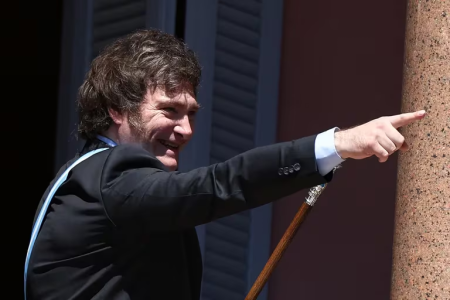
The Javier Milei phenomenon, analyzed by Nicolás Márquez and Marcelo Duclos
It is a biography, but also the reconstruction of a historical time and the dissemination of a compendium of ideas and authors, mostly unknown. The book “ Milei, the revolution that no one saw coming ” presented a unique vision of the political phenomenon of Javier Milei, from his biographical roots to his rise as the central political leader of the Argentine Republic. Nicolás Márquez and Marcelo Duclos , the authors of it, sought to describe the vital, professional and ideological evolution of the president, as well as his dizzying rise and the impact he generated in Argentine politics and beyond its borders.
The book sought to frame Milei in terms of his political and economic ideas, defining him as a libertarian liberal of the Austrian School, which positions him in a more radical and disruptive vision than traditional Argentine liberalism. The work - which Hojas del Sur published and will hit bookstores at the end of the month - explored how Milei challenged conventional political categories, generating confusion and attraction both in Argentina and abroad.
“ Milei, the revolution they didn't see coming ” reconstructed how Milei paved his rapid popularity, based on an unusual charisma, a provocative style and an ability to challenge the political and economic status quo . He recreated how his ability to generate debate and confrontation made him a reference for those who were looking for alternatives to the established political systems, both in Argentina and in other countries.

"Milei, the revolution they didn't see coming", by Nicolás Márquez and Marcelo Duclos
“Milei embodies not a change of government, Milei embodies a change of era. It exceeds the change of government, which, ultimately, is an administrative issue that is provided for in the Constitution. That's why the word 'revolution' is in the book. It is the hinge that is marked in Argentina, which baffles everyone,” said Nicolás Márquez, in dialogue with Infobae about the book that is scheduled to be presented on May 8, at 8:30 p.m. in the Cortázar Room of the Fair. from the book.
In this context, Marcelo Duclos assured: “Javier Milei is a phenomenon that has transcended Argentina, there is no longer any doubt about this. We are no longer talking about the president of Argentina or the representative of liberalism in Argentina, but rather he has become, probably without seeking it, the reference for the ideas of freedom in the West. Along the same lines, Márquez warned that “if Milei does well, it will unequivocally generate a domino effect in the world, because it will be a point of reference (...) and the phenomenon will be replicated, they will to replicate similar leaders in other latitudes.”
The interview with Márquez and Duclos
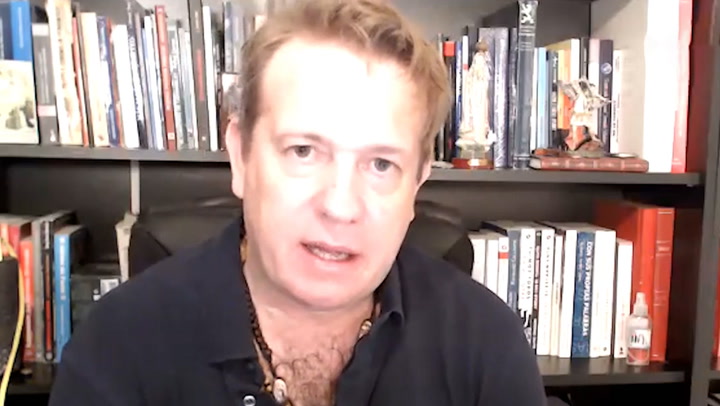
Entrevista Nicolás Márquez Y Marcelo Duclos
Entrevista Nicolás Márquez y Marcelo Duclos
cdn.jwplayer.com
Interview Nicolás Márquez and Marcelo Duclos
-Lets start by the beginning. What did you want to tell with this book?
– Nicolás Márquez: The first part of the book has biographical aspects and also sociological analysis that explain how Argentina changed so that a Javier Milei emerged. It has political analysis, it tells the construction of Milei's personality and the media construction of the Milei phenomenon. Then the political facets until he becomes president. In the talk with him I tried to point out the biographical features, we talked very little about politics. I tried to look for his childhood, which I already knew had been very hard, but I wanted to understand how it had shaped his temperament, his character. And also influences that seem like frivolous traits but that actually mark his personality. Like when he talks about his bilardismo, which seems like a minor, soccer-related facet, on a rustic level, but in reality it marked Milei's personality.
The rock scene and her passion for the Rolling Stones is a fact that not only marked Milei's personality, but also her aesthetics. These are traits that at the same time also influenced the tremendous charisma and ascendancy that she has in her youth. We address political events that affected him and made him decide to study economics. And how, coming from a family of laborers - that's where he gets his admiration for Bilardo - that family heritage of piecework is what gives him this obsession with work and the result. That and, at the same time, that stone self-confidence , provocative, disruptive, both gesturally, verbally, and also in the wardrobe.
We talk about how his thinking evolves, first as an economist influenced by Keynesian ideas, then he encounters liberalism and, to go one step further, with a more extreme vision, which is based on the thinking of Rothbard, which by Many people consider him - Marcelo knows this very well - the father of what libertarianism is. Here it is important to say that Milei is not an Alsogaray-style liberal. He has a more radical vision. He is not the traditional liberal of Argentina, neither ideologically, nor aesthetically, nor sociologically. Because historical liberalism has been a place where the great electoral bastion has been the highest classes, the elegant environments. The historical vote of that segment belonged to a relatively small socioeconomic stratum. What Milei did was popularize those ideas and, even more, bring them to dispute in very vulnerable places with Peronism.
Milei does not represent a change of government, Milei embodies a change of era. It exceeds the change of government, which, ultimately, is an administrative issue that is provided for in the Constitution. That's also why the word revolution is in the book. Milei is the hinge that is marked in Argentina, which baffles everyone. Both journalism and opposition politicians, political scientists, specialists, do not know how to frame it. Milei generated confusion in political analysis and her figure is outside of every political science manual.
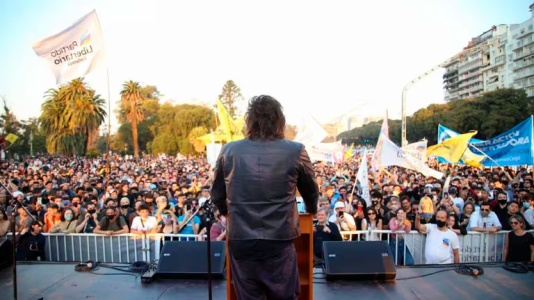
The emergence of Javier Milei in Argentine politics, which took him to the Presidency of the Nation in three years
–I convey the same question to you.
– Marcelo Duclos: They don't even have the categories to pigeonhole Milei. To do this you need the concept and the object of study. Surely one of the greatest contributions that the book can make, not only for its followers, but also for its critics, is that they will find places where they can begin to pigeonhole it, because still many - and I am talking about very high lines of the opposition and even from some sector of the government - are directly unaware of the categories where to place it.
–How is Milei then defined in ideological terms and in terms of tradition, of thought?
– MD : Broadly speaking, if one has to go into terminology, it places him as a libertarian liberal from the Austrian School of Economics. All the concepts that he uses, all the definitions that he says, for me and for a tiny group of people is not new. But the space or current that he represents ideologically was the minority of an Argentine liberalism that was already a minority. We are talking about a minority within a space that was already a minority.
This tradition has been developing, it is very difficult to elaborate when starting from liberalism, but generally starting from John Locke, beyond other antecedents that had to do with authors who thought about putting a stop to absolute power. With Locke we began to talk about political liberalism, a century later, with Adam Smith, we began to talk about economic liberalism, but it was only in the 19th century that the pegs began to be adjusted a little and progress on these ideas emerged.
In the book we focus on the Austrian School, with a super plain language. You don't need to have an idea of economics to understand. But it is also important because there is a lot of confusion and pertinent doubts. How if Milei is an anarchist is he in charge of the State? Isn't anarchism leftist, isn't it against private property? What is the difference between traditional anarchism, from the A in graffiti to the circle, with the theory that the president claims to defend? All of this is explained in an accessible way. It is likely that someone who reads it will give a conceptual framework to the ideas that they have out of common sense or inclination. And people who are not going to agree either when they finish reading the book. But at least you will know where to locate Javier Milei.
– When did you decide to make this book? What was the objective that brought you together to say “let's make a book”?
– NM : It was a book made at tremendous speed, which also reflects what mileism has been : a guy who launched himself into politics and in three years became president. Even the book has that vertigo, of having been written 12 hours a day writing like crazy. Marcelo is a libertarian trained at ESEADE who always adhered to these ideas and I am a conservative, who always sympathized with Javier and always supported him. In general terms we agree and we experienced the campaign and we suffered without being candidates or being affiliated. We have seen this situation that occurred as unique: it was now or never, in terms of the political situation, of the possibility that the bulk of the ideas that each one held were represented in a person, a person who was challenging the political apparatuses. traditional.
On the one hand, the book has a whole series of features, such as those that have to do with Milei's profile and influences, as well as with the Argentine political process. Because I also made an introduction to the last 50 years of Argentina, which were from the “anti-subversive war” to the appearance of Milei, at a time when Argentina was exhausted and devastated. The influences and how the entire political process was that took him to the top. I tried to explain and explain to myself. How can it be that someone who was the minority of a minority suddenly gets 56% of the votes?
Marcelo Duclos already had Javier Milei's entire philosophical and economic library fully studied. That's also why we were able to do it so quickly, because there was a lot of prior knowledge, because if we had had to do research work from scratch we would never have been able to make a book in three months.
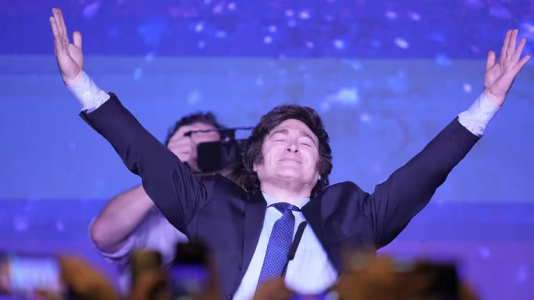
The day Milei won the PASO and started on her way to the Casa Rosada
–What was your idea for approaching this book? And why was a book necessary that, in quotes, explains Milei?
– MD : Talking to the director of the publishing house about the short time to write it, he told me “you didn't write this book in a month, you have been writing it for 20 years . ” It left me thinking and I return to the question: everything that I wanted to say years ago, that I wanted to put in a book or in a decalogue of a liberal manifesto, if it came out as “The Manifesto of Liberalism”, by Marcelo Duclos, at this moment We are not doing a note for Infobae and this book would not have a pre-sale and with everything that is happening.
What I wanted to write did not have to be forced on the situation, because when Javier Milei is in front of a journalist discussing whether or not to have a Central Bank and says “you are in favor of theft” , or when in a discussion a little more heated regarding public resources, he says “with other people's asses we are all whores” (sic), although it sounds comical, it allows you to write a book on economics, ethics, and philosophy through a trigger. How can it be that a phrase that seems even comical has to do with explaining that, for example, within Kirchnerism there is a party called "Solidarity Party", which promotes a solidarity tax, when if one goes to terminology, the question Solidarity has to be something in the voluntary sphere, where the State has nothing to do with it.
There was a lot from the theoretical to get down to the plain and that Javier Milei - through his input , discussions, his arguments - allowed us to open up and be able to explain a lot of things that, logically, he, with the course of the interviews, the questions and especially with many malicious journalists who want to catch him offside or take a line out of context for a title that messes with something, it gives me the opportunity to sit down and explain a lot of things that I have wanted to write for many years. and that Javier has left it directly to me on a platter.
–What would you say if you had to recommend the book to people who are not interested in politics and who understand little about economics?
– NM : I would say that the first part of the book serves to understand Milei outside of the professional politician's manual. Do not study him or see him as a professional politician. In the book you will find aspects of his personality that will allow you to understand him and you will be able to analyze him not with the manual of a focus group , but from a totally different perspective. That is the main contribution. And what Marcelo Duclos did is go down to earth with remarkable pedagogical capacity - because it is very understandable - concepts that seem complex. From the educational voucher , to Milton Friedman or concepts that perhaps are only for connoisseurs.
It serves for the militias militancy - to be able to defend much better the government to which they adhere - and for many people who, out of prejudice, are accustomed to embracing social justice, solidarity, the present State, labor achievements, many people who believe that all of this It is good, and the book explains why, not only is it not good, but it was applied in Argentina and it did not work. From that point of view, it seems to me to be a book that can reinforce the conviction of those who support the Government and can perhaps persuade those who have doubts or mistrust.

In the general elections, Milei finished second and then defeated Sergio Massa
–Marcelo Duclos...
– MD : In the first part you will learn more about the phenomenon of a very interesting person about whom a lot was lied about and many things were said. Books were written without sources, with rumors, a lot of unserious journalistic material. I absolutely assume that many people will finish the book saying “how important what I learned in the second part”, but I am very clear that it comes in through the first, where it allows us to learn more about the phenomenon and learn a little about recent political history.
This entire introduction will serve as informative material, especially for a new generation that enters not only politics and liberalism through Milei - very young people who will find a brief summary of recent Argentine history - and who will end handling economic concepts. Many people who today criticize him or have doubts about the figure of Javier Milei will realize that many criticisms are absolutely unfounded on purpose, because there is an intention to distort what he wants to say.
Regarding the vouchers , we already saw the atrocities that were said during the campaign. Many well-intentioned critical people or those who have an incentive to be on the opposite side of the Government are going to see a new perspective. There is a strong corporation against the Government that will never be convinced because it is not an ideological difference, it is not an intellectual prejudice, but this government is directly attacking many sources of financing and logically there will be corporate resistance. You will never convince that.
–This book is going to be sold in more than 15 countries. Why is there so much interest?
– NM : There are more. At this moment it is on pre-sale in 12, but four more countries have been added and it is also being translated into Portuguese, Italian, English and Polish.
–The question is, do you believe that the Milei phenomenon is a phenomenon that will transcend borders?
– MD : It has already transcended borders. You go along routes in the United States and there are the signs “More Milei, less Marx” . This is a fact. I was in Japan and I couldn't believe it. Recently I saw posters for conferences that wanted to explain the Javier Milei phenomenon, conferences that had a cost of 80 or 90 dollars. I receive messages every day from people who are asking me about English, about Portuguese, people who speak to me in English who want to know.
Javier Milei is a phenomenon that has already transcended Argentina and there is no doubt. We are no longer talking about the president of Argentina or the representative of liberalism in Argentina, if he did not convert, probably without seeking it, because we are talking about someone who a while ago said “the only position he would accept in politics would be the leadership of the Central Bank to close it”, but which has become the reference for the ideas of freedom in the West. The phenomenon is already raised and we are surprised by the demand in the book world.
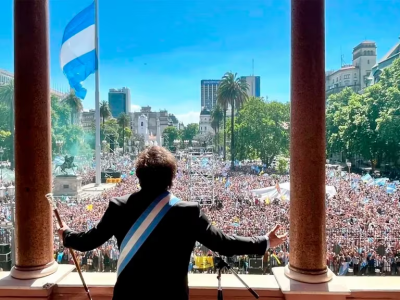
The inaugural speech from the balcony of the Casa Rosada. Milei before the people
–Why did it quickly catch on in Argentina in a very short time and spread throughout the world, also in a super dizzying time? What is Javier Milei capturing in Argentina, but especially outside of Argentina, abroad?
– NM : First, there is a progressive cultural hegemony that has been printing its stamp and its discourse for many years in a very strong way throughout the West, in Europe, in the United States and in Latin America. Javier Milei is a totally disruptive character but he is also a provocateur. He goes to Davos and does not seek to ingratiate himself or accommodate what he thinks in an environment that may not be entirely friendly. He goes straight to kick the board.
That impetuosity arouses confusion, adhesions, fascination and detractors, not only in Argentina, but wherever he moves. He would say that consciously or unconsciously he enjoys being a provocateur. He is more comfortable in hostile environments than in friendly ones. It's not that he spoke better or worse, but his incursion into the Davos Forum had a greater impact than in the C-PAC in the United States, where it was an environment where he had an affinity. He feels comfortable provoking and that provocative spirit that he knows how to handle with such skill carries us through his genetics. There is nothing overacted. He also causes him to generate the phenomenon that he has generated, a leadership that, as Marcelo said, far transcends the geography of our country.
–What phenomenon does Milei capture? What demand does she attune to?
– MD : With the things that are happening in the world. For example, when we see the attack by terrorist groups in Israel and we see a president like Lula who comes out to talk about something vague and does not condemn a terrorist group that went in to kill people because they are Jews. You are in Spain and there is a news story from last week where people who own property in a tourist place receive an intimation from the government that they must rent to tourists. Or you are in Colombia and you see a guy who comes out to talk and you don't know if he is sober and he says something stupid and it is causing terrible damage. In many countries faced with absolutely lost governments, there are still oppositions that are within the traditional political game that cannot channel it.
We see why people in Colombia come out to say “We want a Milei.” Or in Chile, “We want a Milei.” Because the same opposition to many governments that are causing disasters is part of that policy that is speculating. A demand is being generated in the world that I am sure will end up impacting the electoral offer of many countries.
–Is Milei going to be a reference for oppositions to progressive systems abroad?
– NM : We are betting on success and we firmly believe that if Milei is not doing well it is not because he is wrong in his ideas or convictions, but because political reality does not allow him to advance beyond what he wants, because he has obstacles from corporations, starting with the Legislative Branch. And so we can mention a lot.
If Milei does well, it will unequivocally generate a domino effect, because it will be a reference point. We're not sizing it yet. As it is a contemporary phenomenon that we are experiencing and learning about as we go, if it does well it will go down in world history, not in the history of Argentina, in world history. And the phenomenon is going to be replicated and leaders are going to be replicated in other latitudes. That also explains the fact that the book is becoming international, which did not happen with any previous president.
– MD : Although these spaces like to call themselves progressive, what I believe is that there are entrenched corporations that use a discourse that is good to promote and finance political corporations that have nothing ideological but rather established corporate interests, which have a lot to lose. . In Argentina they already saw it when Javier arrived at the Casa Rosada and the world seems to be beginning to look at what could happen with this.

